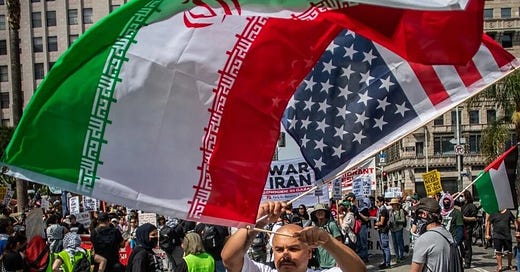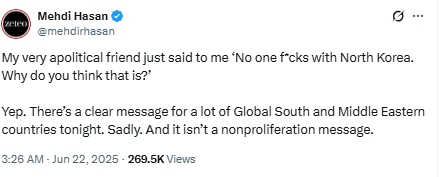Musings about International Politics from an Ill Person
And why Nuclear Weapons are not a protective shield
First of all, readers, I must apologise for my lack of writing. Unfortunately, I have been stuck in bed with the flu. The result has been a complete lack of writing. Nevertheless, I hope you enjoy this latest effort :)
The strikes on Iran have opened up new frightening possibilities for the Middle East and the world. Although these strikes are not the opening salvo of World War 3, as some predict, they do contribute to the growing number of conflicts emerging today. We should not be surprised by this development, given the increasingly reactionary and militaristic nature of governments in world capitals such as Washington, Jerusalem, and Moscow.
The End of History never predicted the world would slowly slumber into an era of peace and Liberal Democracy. Instead, we are seeing the backlash that Fukuyama believed would occur. Pre-liberal notions of identity and fear pervade the world sphere today, leading to the breakdown of the international order. Despite the existence of complex institutions designed to help manage international politics, we cannot escape the anarchy that pervades our lives.
There are those who attempt to frame the brewing conflict as almost business as usual. Let the Americans bomb nuclear sites, do it quickly and quietly, and then resume some normalcy. But there are those who see through this failure. This is not a period of normalcy, and neither should we see it as such.
Instead, we should be wary even if Iran is running out of options. The Axis of Resistance is now thankfully smouldering ash in the ground, and the regime is the weakest it has been since the Iran-Iraq war. Enjoying little domestic and international legitimacy, Iran today is boxed in and facing an existential threat. So, and most importantly, is its captive population.
Despite what should be our happiness at the degrading of such an evil regime, and yes, for those still in denial, Iran’s regime is at best amoral and at worst actively evil, we should all be fearful of how Israel and the United States are perpetrating this. The use of violence and attacking civilian infrastructure is not going to achieve regime change. It is, instead, in the long run, an ineffectual attack which will be seen for the pointless act that it is. Ultimately, this episode will not change much.
A question is posed that surely this episode highlights why nuclear weapons are so important. The typical example used is North Korea. The North has spent decades developing a nuclear programme and has successfully managed to cultivate a significant stockpile of both atomic warheads and payload delivery systems. Journalists such as Mehdi Hasan, now argue that this is why no-one ‘fucks with the North’.
But this is not necessarily true. North Korea has avoided intervention for several geopolitical reasons. The South does not want to foot the bill for a reunion which would vastly dwarf what it cost West Germany to integrate the East over the past three decades. China would spit blood if any foreign, let alone US troops, were situated on their border as a peace-keeping mission, and the US can use the threat of the North to station military equipment, warships, and troops in the region while developing military alliances with other states in the region. Sadly, nuclear weapons are the least of the reasons why the tyrannical regime in Pyongyang still stands.
If anything, North Korea has shown the world that the threat of a nuclear weapon is just as persuasive as an actual weapon. The North, for decades, has used the hope of denuclearisation to gain cash, diplomatic favours, and publicity to sustain its ailing regime. The weapons pose less of a threat than what they symbolise- the perpetuation of fear. Regimes such as the North are experts in managing and escalating that fear to achieve the maximum outcome for themselves.
Necessarily, this opens up the question of if North Korea can develop nuclear weapons, then why can’t Iran? The North is significantly more impoverished, less developed, more isolated, and less educated than Iran. North Korea is the most sanctioned country on the planet, cannot feed its population, and does not have widespread internet access. It is not only domestically sealed off but is also internationally surrounded by those unwilling to tolerate a nuclear weapons programme from the North. If Iran were truly determined to make a nuclear weapon, then surely they could have done so by now. Occam’s razor leads us to conclude that the reason why they do not possess an atomic weapon is that they are not seeking one. If they were seeking one, it would be the most prolonged and disjointed atomic effort since the race began.
Despite Israel’s efforts in killing off their atomic scientists, and previous agreements, I would argue Iran has in the past used the threat of the nuclear bomb just as North Korea did. To help lift sanctions previously placed on the regime so they could spread their influence and to develop an image of themselves abroad as pragmatic, defensive, and responsible. This is why the JCPOA nuclear deal ultimately proved to be a bad one. It gave Iran far too much for its ultimately non-existent nuclear weapons programme. A programme, they continue to deny having.
The uncomfortable truth is that if a regime wants to develop a nuclear threat, then it can. North Korea is the proof. Decades of sanctioning, negotiating, bribing, and pleading ultimately achieved nothing. Neither the carrot nor the stick worked. The international community is powerless to stop a regime from developing such a threat if it has a serious intent to do so.
I am not the Peter Oborne stripe, the least conservative self-proclaimed conservative man in the history of politics, who believes that Iran has every right to develop a bomb if they so wish. Just as North Korea should not have one, Russia should not have one, and neither should Iran. Although Iran is not acting ‘irrationally’ the danger with authoritarian regimes is that they can be irrational.
This is because all authoritarian regimes rely on a degree of cronyism, promoting lesser individuals in exchange for the promise of loyalty and domestic stability. This is why authoritarian regimes tend to perform poorly compared to democracies in terms of warfare, economic performance, and domestic political sustainability. The danger with any authoritarian system is the degradation of rationality towards the irrational and even the crazy. The lack of structure inside a tyrannical system and excessive personalism inherently lead to dangers emerging.
This is not to say democratic states are immune to such fears. There have long been concerns over the protocols for the use of nuclear weapons, especially in the United States, where the President’s powers remain significant. We only need to look at the infamous case of Nixon and his Defence Secretary in the final days of his disastrous regime, highlighting the lack of guardrails in the deployment of these most frightening weapons. It seems we all live in anarchy when it comes to the nuclear threat.
But paradoxically, it is this anarchy which keeps nuclear weapons usage off the table. Despite rhetoric for their use becoming increasingly prevalent and violent, look at Putin, Trump, and Kim Jong Un, it is no coincidence that nuclear weapons have yet to be used since the Second World War. The atomic norm remains even if we are increasingly powerless to enforce it.
So, what does this mean for the current action against Iran? At best, it is a fruitless attack which engenders sympathy for an authoritarian regime lacking legitimacy at home. At worst, it has opened up new sources of asymmetric conflict, which will in the long run increase instability. Fundamentally, until there is significant movement inside the Islamic Republic, regime change is a no-go, and we all have to live in the shadow of nuclear politics. Living in the shadow is a price worth paying and is a safer course of action compared to attempting to move out of it.





